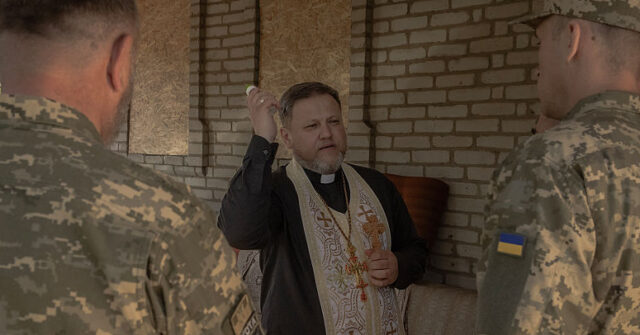Ukraine and Russia have accused one another of breaking the Easter truce thousands of times, each insisting the day proves the other to be untrustworthy and not truly interested in peace.
The Russian Federation called an Easter ceasefire at the weekend, with Ukraine later stating it would “mirror” Russia’s actions, ending hostilities if Moscow moved first, and later saying it wished to see the declaration extended to a longer temporary cessation of hostilities. Ukraine characterised this as “silence for silence”.
Yet both sides have declared the Easter truce a failure, each characterising their own approach as noble and the other as hostile and dishonest. Kyiv, for instance, stated there were “96 combat clashes” on Easter Sunday with 1,882 “attacks on Ukrainian positions.” These, they said, were by artillery, tactical rockets, and drone strikes.
Ukrainian President Volodymr Zelensky railed against Moscow, stating that across all fronts “Russia has failed to uphold its own promise of ceasefire” even if he did note — unusually for this war — there hadn’t been a single air raid all Sunday, suggesting the Russian Air Force at least had stayed at home for Easter.
Worse than merely keeping the attack up, where the ceasefire was said to have been observed by Russian forces, Ukraine accused Moscow of using the lull in fighting to cynically redeploy and reinforce their troops for greater advantage. Such accusations track closely to broader Ukrainian narratives on why a lasting peace with Russia is essentially impossible, claiming that all previous attempts to broker peace were used to get breathing space to increase military capacity for later, more brutal assaults.
Ukrainian state media cited Andriy Kovalenko, the head of the Centre for Countering Disinformation at Ukraine’s National Security and Defence Council, who said getting cover for bringing up reinforcements was the whole point of Putin suggesting an Easter ceasefire. He is reported to have said: “This was the Russian intent — wherever the intensity of fighting decreased, they used the opportunity to move in reserves and equipment for future assaults.”
Kovalenko said this pattern had been observed before, for instance, after the 2014 aggression and the Minsk accords, which he said Russia used to rearm.
Russia, for their part, accused the Ukrainians of much of the same. Moscow’s Ministry of Defence on Monday accused Ukraine of 4,900 acts of war during the ceasefire, with Parliamentary committee chair Grigory Karasin stating: “Kiev failed to ensure even a day and a half of the Easter truce. It was breached by the Ukrainian military many times, despite Kiev’s assurances”.
Echoing Ukraine’s narrative that Russia’s ceasefire breaches showed them to be untrustworthy and difficult to negotiate with in good faith, Karasin returned the comments, essentially saying exactly the same about Kyiv. He said: “We can say emotionally that it is improper to do things like that! So, what strategic accords on resolving the Ukraine crisis can be the subject of negotiations, if even simple short-term commitments are associated with mass breaches?”
Russia’s Ministry of Defence, of course, insisted that all of its forces had scrupulously obeyed the ceasefire ordered by President Vladimir Putin.
Putin himself, meanwhile, said on Monday that combat operations had now restarted and claimed Ukraine had only agreed to a ceasefire at all because the U.S. had pressured them into it. The Russian leader asserted: “We all saw the initial response – they issued a statement dismissing our proposal as a game with people’s lives and similar rhetoric.”
The asymmetric views on the conduct of the war and the basic good will of respective enemies has, predictably, emerged as a significant stumbling block in ongoing President Trump-led peace talks. In essence, both sides claim to be fighting justly and nobly, while the other is guilty of war crimes and a war of aggression.
Although the respective merits of those claims can be debated, in terms of bringing the parties to the negotiating table, it has undoubtedly led to a halting and stumbling process that has evidently exasperated United States negotiators, who have expressed their frustration with endless unproductive meetings and the lack of progress. President Trump’s Secretary of State Marco Rubio said on Friday that if there wasn’t solid evidence of progress within days, his principal’s instinct would be to simply walk away until Ukraine and Russia felt willing to approach peace talks in good faith.
He said: “We came here yesterday to begin to talk about more specific outlines of what it might take to end the war, to try to figure out very soon and I’m talking about a matter of days, not a matter of weeks, whether or not this is a war that can be ended.”
“If it can, we’re prepared to do whatever we can to facilitate that to make sure that happens, that it ends in a durable and just way”. No progress would mean “the President’s probably at a point where he’s going to say ‘well, we’re done’”, he said.
Read the full article here


